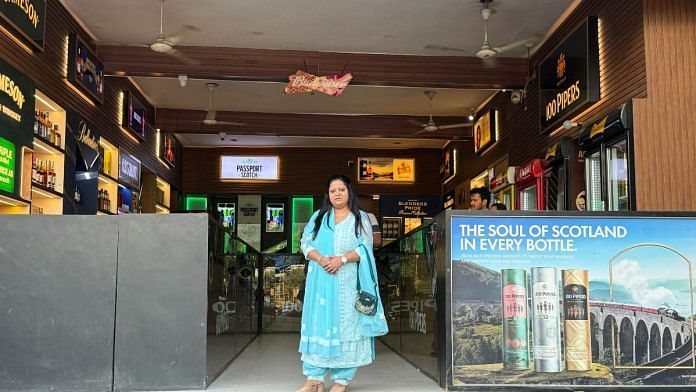Noida/Ghaziabad: Kalpana Aggarwal, 42 has a new name — the “Liquor Queen” of Indirapuram, Ghaziabad. Amid the bustling malls, branded clothing stores, and busy roads, her “model liquor shop” stands out with her name emblazoned at the entrance. Every time a customer enters the store, they stare at Aggarwal with confusion – a woman running a liquor store, they murmur.
Uttar Pradesh is changing. In more ways than one. It is the new liquor capital of India, with the highest manufacturing of potable and non-potable alcohol and sales in the country.
Aggarwal opened the store in 2020 after she got stuck in Ghaziabad with her husband Dilip Kumar during Covid. It was when Aggarwal, who was living in Gwalior in Madhya Pradesh before pandemic, came to know about the amendments in Uttar Pradesh excise policy through a friend. This was not her first attempt at entering a sector where men call the shots. Earlier in 2014 when she decided to get a liquor license, she was met with resistance from the already established players, so she opted out, she recalls.
“The amendment in the excise policy by the UP government has overthrown the monopoly of the big players and has made it possible for small business persons like us to enter the liquor field,” says Aggarwal.
Wearing sky blue salwar kameez, unaffected by the murmurs, Aggarwal sits like a boss lady at the counter, greeting customers, and overlooking the management. In evenings, she can be seen attending calls to arrange liquor for the kitty parties and women who want alcohol but discreetly, so she can get them delivered at home. She laments that the Uttar Pradesh government still doesn’t allow women salespersons.
Karnataka is now a distant second. Our policy completely moved
the industry from a license fee-based system to consumption-based system to break the monopoly
— Senthil Pandiyan, Excise Commissioner, Uttar Pradesh
Uttar Pradesh has emerged as a liquor hub. Swanky stores masquerading as liquor malls, ahaatas, microbreweries, replicating Gurugram, dot the NCR towns of Noida and Ghaziabad. From The Weekend model stores, to in-house beer brands such as Campai and newly launched Winery and brand Regina in Muzaffarnagar, Uttar Pradesh is at it. And it’s all translating into numbers, big numbers that tell how high UP is. The state recorded excise revenue generation of Rs 42, 250 crore in FY23 – a threefold increase from Rs 14,000 crore recorded in 2017-18, the year BJP and Yogi Adityanath came to power. UP surpassed Karnataka — a bellwether state when it comes to liquor revenues — to become number one. But like Karnataka, UP has no Bengaluru, the IT hub and home to high-earning youth who are regular bar hoppers and host house parties.
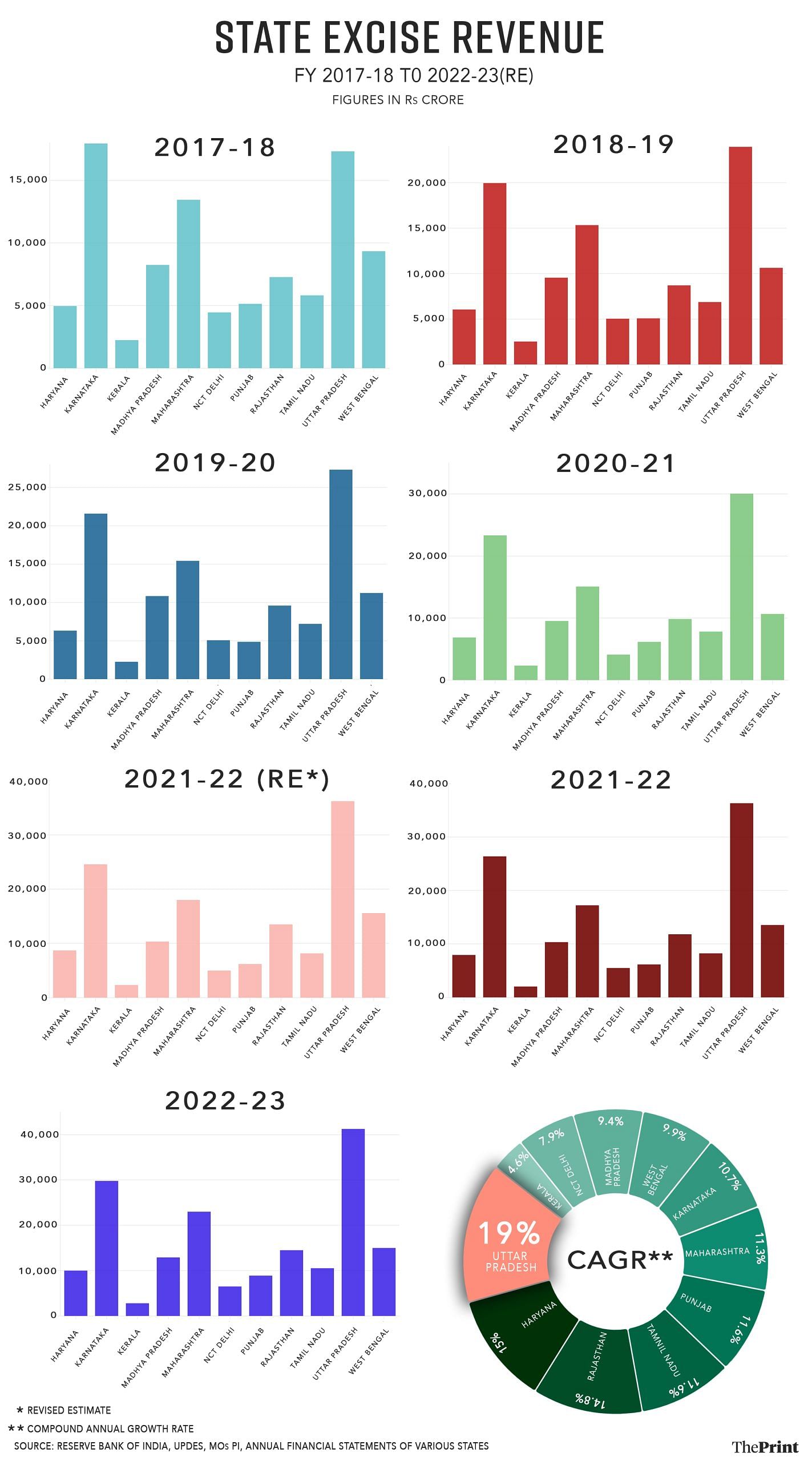
Not long ago, liquor sales in UP were synonymous with dingy shops with huge black grills and booze of questionable quality. A Dilli wala would often frown at the mere thought of consuming alcohol produced in UP. Today, swanky liquor stores with high-end furnishing dot Noida and Ghaziabad. UP liquor culture is going through transformation.
Unlike in Delhi government’s controversial excise policy of 2022-23, where licenses were granted to liquor traders through open bidding leading to alleged favoritism and cartelisation, UP has the e-lottery system that allows small players to enter the industry.
“Karnataka is now a distant second. Our policy completely moved the industry from a license fee-based system to consumption-based system to break the monopoly. We also restricted the number of shops to two per person. The allotment pattern was changed to the e-lottery system from the earlier auction-based model. We have used technology to put track and trace systems in place. And this all has happened with the support of CM Yogi Adityanath,” Senthil Pandiyan, Excise Commissioner, Uttar Pradesh told ThePrint.
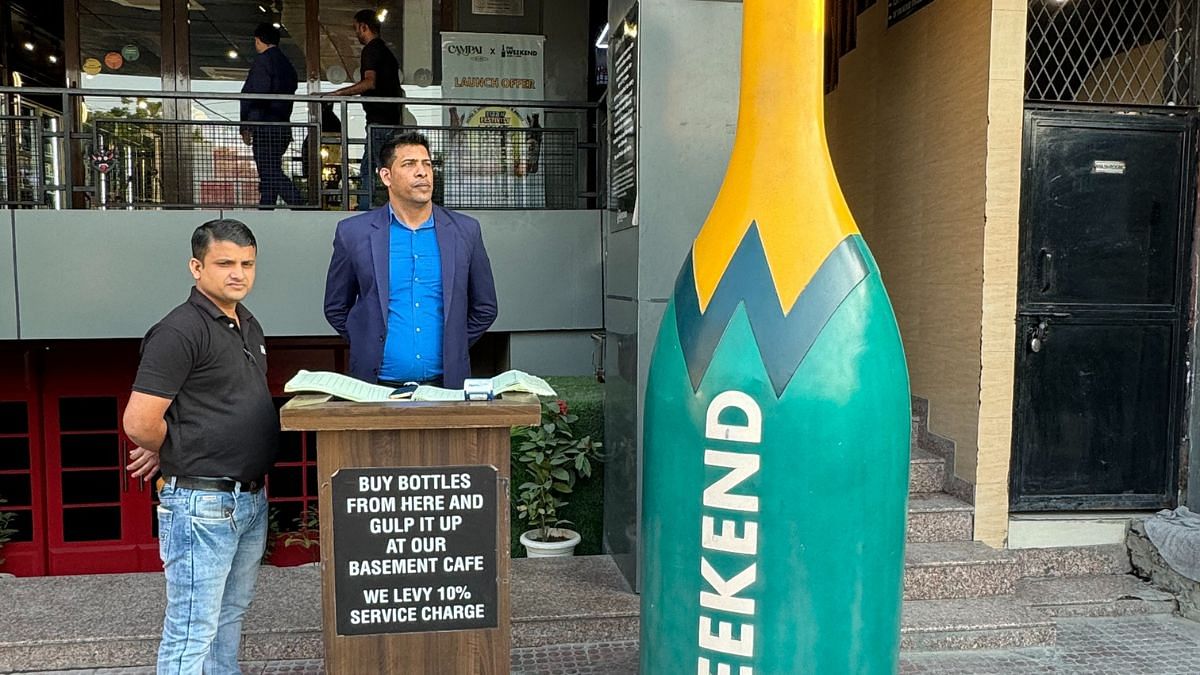
Also read: More Indians are seeking moksha through science. Medical colleges have surplus corpses now
CM ‘doesn’t like liquor but loves revenue’
Whenever there is a meeting with the CM, the officers at the excise department in Lucknow find themselves in a difficult situation. They have to use the word “liquor” as little as possible—while they talk about liquor and its policy.
“Yogi ji does not like the word. He makes a face whenever we say it,” says an official in the UP government, on condition of anonymity, laughingly.
The officers say that CM Yogi has full faith in them and has given them a free hand to bring about changes in the excise policy. It was the CM who wanted the smuggling of liquor to end and that’s when the track and trace system was put in place, says an official in the state excise department.
Had revenue not been the reason, Yogi ji would have himself formulated a ban on liquor policy. The CM doesnt like the word liquor but he wants and loves revenue
— UP govt official
Now, each vehicle transporting liquor is monitored from the entry point to exit. The vehicles are also geo-fenced and digi locked, says Pandiyan.
But whenever Yogi ji is told about liquor, he shuts his eyes and says, “okay, do it,” says another officer at the department requesting anonymity.
CM Yogi is known for his anti-liquor stance. Recently, he even announced a ban on liquor and meat consumption in Ayodhya.
But officials believe that any kind of ban on liquor would be futile and foolish and would be a hindrance in the development of the state, and the CM has understood that.
“Had revenue not been the reason, Yogi ji would have himself formulated a ban on liquor policy. The CM doesnt like the word liquor but he wants and loves revenue,” says the officer quoted above.
But not at the cost of corruption, says former Principal Secretary Reddy. Reddy and Pandya are seen as two men behind the re-worked excise policy.
“Everything is decided by the Cabinet. The CM didn’t want people to die of consuming spurious liquor. There are no incidents of spurious deaths in recent years. You cannot stop people from drinking. That’s been happening since Sanatan Kaal such as Bhaang,” says Reddy.
Between 2017 and now, 25 new distilleries and two breweries have come up in the state. Gautam Buddh Nagar (which includes Noida and Ghaziabad), Lucknow Gorakhpur, Kanpur, Ghaziabad, Agra, Varanasi and Prayagraj are major districts that have contributed more than Rs 500 crore every year in the revenue generation since 2017.
“Uttar Pradesh’s revenue is heavily dependent on liquor. While GST contributes over 50 per cent of the state revenue, excise adds to a sizable 22 per cent. Losing such a sizable revenue will affect the welfare policies in the state,” says an official, on condition of anonymity.
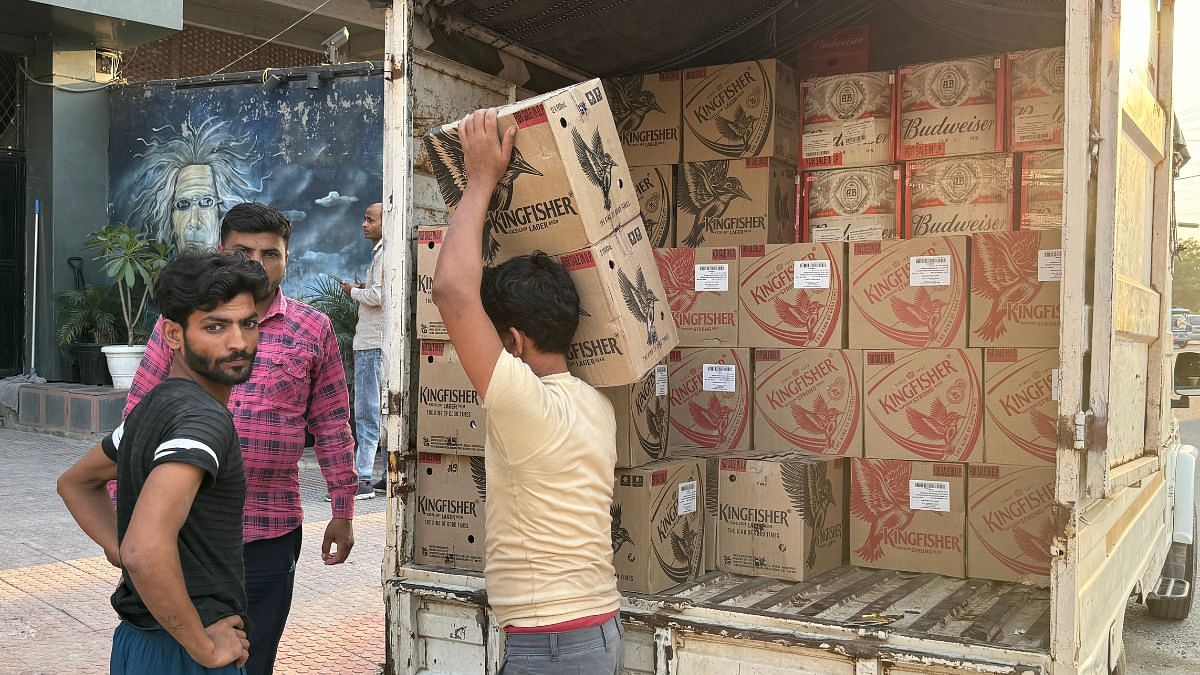
Also read: An email from an AIIMS doctor changed India’s abortion debate. Heartbeat the new flashpoint
Liquor malls, Ponty Chadha 2.0, political pressure
At the swanky The Weekend liquor store in Noida sector 104, there is a dedicated wine cellar in one corner and premium liquor brands in another. Upscale furnishings with vibrant white-yellow lights and a salesman in black coat and trousers guiding customers encapsulates the mall-like comfort.
“It’s a liquor mall,” grins a customer who has come with his son for the first time.
At the entrance of the store, a staircase leads to BYOB (Bring Your Own Booze) — a huge sitting hall modelled around Gurgaon aahatas. Except this is far more luxurious with sofas, comfortable chairs, an LED and an open space to smoke and enjoy the outside view. Women can be seen comfortably enjoying their time.
The first store of The Weekend was established in 2020 after its owner Saurabh Goyal, 52, was fascinated by the open sitting arrangements at the liquor stores in Gurgaon. A native of Dadri, Goyal wanted to bring this to Noida. Goyal, who was in fine dine business, has recently ventured into the liquor industry.
“That’s when I went to Lucknow and met then Principal Secretary Sanjay Bhoosreddy and Commissioner Senthil Pandiyan. I put forth my proposal and they readily agreed. And I got my license within a month,” says Goyal sitting on a sofa in his luxurious office in Noida Phase 2.
After The Weekend became a success, Goyal opened three more such stores — a second in Noida and three in Ghaziabad. With the excise policy only allowing two stores per person, Goyal took help from the family members. Goyal has two stores running in his wife’s name.
His competitors call Goyal as Ponty Chadha 2.0 for harboring big ambitions of becoming a “liquor baron.”
“Goyal is the only one giving competition to Ponty Chaddha,” says Madhur Gupta, who owns Ghaziabad’s first microbrewery, jokingly. Goyal’s The Weekend also has a microbrewery to its name in Noida.
There are only three microbreweries in Uttar Pradesh — all established in 2022 — with one each in Ghaziabad, Noida and Agra.
Goyal now aims to take the brand to Lucknow. But the new “Ponty” may have to wait for now.
“I have made several rounds to Lucknow but they are not accepting my proposal. If a brand is giving a good business, luxurious experience to the customers, the excise department should let such a brand excel,” says Goyal.
But the officials are themselves in a tight spot. Sources within the Uttar Pradesh government pointed at the political pressures behind the slow expansion of premium liquor stores.
“Elections are round the corner and the top leadership doesn’t want liquor stores to become an issue. Noida and Ghaziabad are next to Delhi and such stores are needed there. A walk-in liquor store in Lucknow can be a source of backlash,” says an official requesting anonymity.
Around 85 per cent of excise revenue comes from sales of alcoholic beverages in the state, as per the officials.
“Almost 10 per cent of the revenue comes from different kinds of license fees of shops, retail as well as wholesale, and the rest is from other receipts that include import fees, export pass fees, processing fees, regulatory fees, bar license fees, composition money and all other items,” says Reddy.
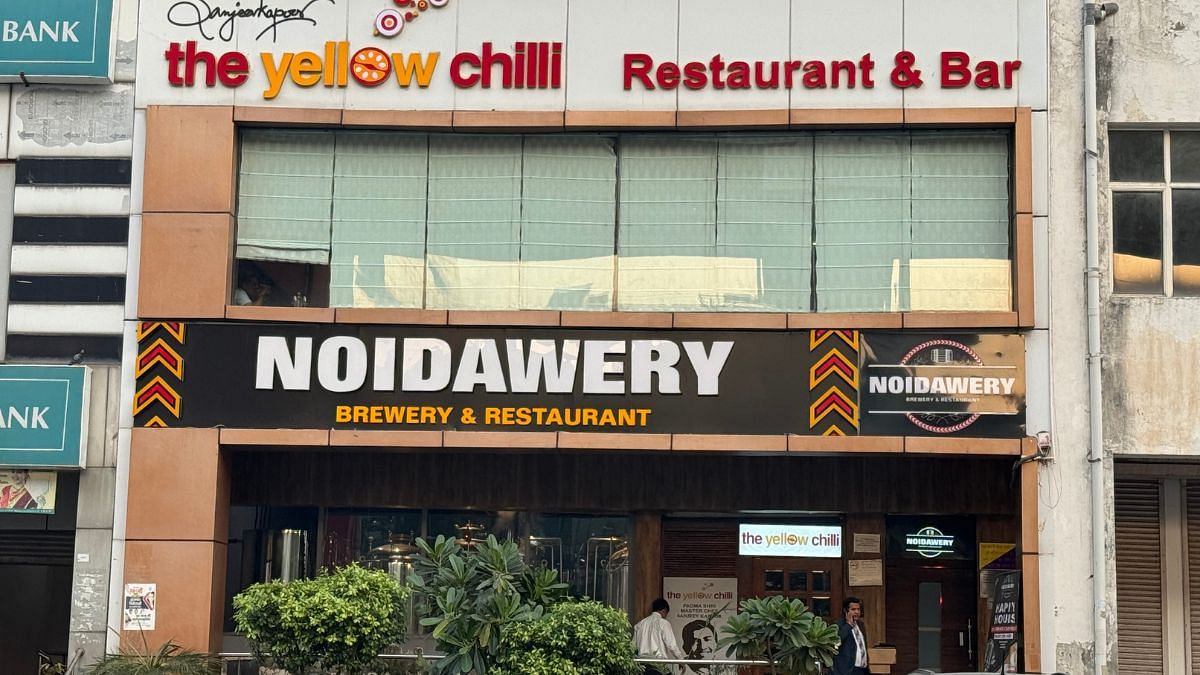
Also read: Mahua Moitra is ‘jack-in-the-box’ without a godfather. Her entire life choices are on trial
UP’s own high
It was a promotional event inviting investors in the liquor industry by the excise department in Hyatt Lucknow that made Sanjay Gupta, a resort owner in Muzaffarnagar, open a boutique winery. It is the first winery in North India. At the event, which saw the attendance of people from the liquor industry, Gupta was an odd one out.
“I had never done a liquor business. I have a resort on Muzaffarnagar highway and was producing sanitizer in Covid. That’s how I got in touch with the excise department,” Gupta recalls.
After the event, Gupta was called by Reddy who convinced him to open a winery.
“The department said that I don’t have to pay an excise fee for five years so I agreed. Within three days, Bhoosreddy sir got me the license,” says Gupta.
The officials said that the winery aims to use sub-tropical fruits such as lychee, mango, jamun and oranges to produce wine. Districts where the fruit cultivation is highest are being identified so that wine units can be set up there.
“This way, farmers will get the right price for their produce and the state will generate employment and revenue through the sale of wine,” says Pandyan.
Gupta, who has put in Rs 4 crore to establish the winery, will start selling the wine in soon under the brand name Regina.
“In a few days, the sticker (label) and brand name will be approved and I will start selling bottled wines,” he says.
“Several states such as Kerala, Haryana, Maharashtra, Karnataka have adopted various components of our policy. The first thing we did was ease of doing business. Stages of getting a license were reduced. We moved everything online. No one has to come to our office. Earlier, offline there was corruption. We decentralised power to district collector and excise commissioner,” Reddy says.
“The premium retail vendors’ models were picked by other states. In 99 per cent malls, we have premium retail vends. And we have female saleswomen there to guide women. In these vends, you can go check, taste and decide liquor for yourself,” said Reddy.
For the connoisseur of liquor, the UP government is looking at something called ‘home bar’. The excise department officials say that a consumer has to pay a license fee of Rs 11,000 with some minimum deposit and they can have a home bar license. “You can keep 50-60 liters at home,” say officials.
Vedant Chopra who was just 23-year-old when he met Pandyan with the idea of establishing a brewery in Banaras three years ago. A US returnee, Vedant was exposed to craft beer culture in the States and wanted to replicate the same in Banaras.
Now, he sells bottled beer named Campai, which was also the official beverage partner at the inaugural MotoGP Bharat event in Noida. During Covid, when Vedant returned to India, he started producing small quantities of beer at home before he established a brewery on 1,000 sq mt land.
“In Banaras, we have no choices at all. Branded beers stay in Delhi, Noida and other metro cities. Brands like Bira, Hoegaarden and others can’t be found here. So, I wanted to produce craft beer in my city,” says Vedant, whose Wallop Brewery has recently partnered with Japanese beer company named Ise Kadoya.
Vedant says three years ago few took him seriously with the craft beer idea. But Joginder Singh, statistical officer from the excise department welcomed him.
In Banaras, we have no choices at all. Branded beers stay in Delhi, Noida and other metro cities. Brands like Bira, Hoegaarden and others can’t be found here. So, I wanted to produce craft beer in my city
— Vedant, owner of Wallop Brewery
Also read: Pregnancy doesn’t always save women from death row, like in Jawan. It’s a double-edged sword
Good policy but unstable careers
Mahesh Ahuja who owns two model liquor shops, one in Ghaziabad and another in Hapur, has been in the liquor business since 1993 and has seen multiple transformations in the liquor landscape of Uttar Pradesh.
Sitting in his Ghaziabad office, Ahuja recalls how the lottery system was first introduced in 2000 by the Rajnath Singh government. Ahuja had a liquor store in Ghaziabad then. However, in 2007, he wrapped up his business after Ponty Chaddha established a monopoly over the state’s liquor business and small businessmen suffered losses. He moved to Rajasthan and set up a business in Jodhpur.
“For some time, the lottery system was there, after which there was a tender system and the tenders often went to the government favorites. And again, the monopoly started and Ponty Chaddha became all big. It was very difficult to enter the liquor business without facing heat from the Chaddhas,” he recalls.
Ahuja, sitting against a huge poster with whiskey bottles in his background, tells how the 2017 policy changes facilitated his return to the business.
“People in liquor business keep an eye on the changes in excise policy and plan their business accordingly. So, when I learnt about UP, I came back. Applied for the e-lottery system and got my license,” says Ahuja. He had moved to Rajasthan and had opened a liquor shop in Jodhpur.
But getting a license was not the big deal, renewing licenses every year is. Ahuja and his fellow businessmen meet every month to discuss the problems plaguing the industry. They have discussed the same in these meetings in Lucknow but claim the government is yet to act on their pleas.
“When the government knows that they are in power for five years, they should also give licenses for five years. Every year, we live in fear of what new excise policy has to offer or whether our licenses will be renewed or not,” says Ahuja.
Reddy, however, says the license problem is not unique to Uttar Pradesh. The license policy is always annual.
Three kilometers away from Ahuja’s shop, in Indirapuram, Kalpana Aggarwal scrolls through her WhatsApp. Navratras are ending and she has received orders from a dozen women. Few want her to deliver liquor at home, others want her to keep their favorite brands aside. It’s 9.40pm, and a few female customers have just reached home from the office, she says. They want her to keep some alcohol for them. She has refused.
“You can’t keep the shop open beyond 10 pm. Yogi ji should extend the timings at least in NCR till 11pm. Women need alcohol to juggle between the several roles,” Aggarwal laughs.
(Edited by Anurag Chaubey)


